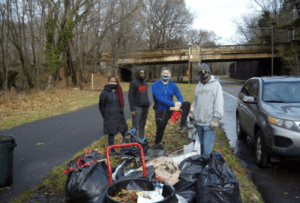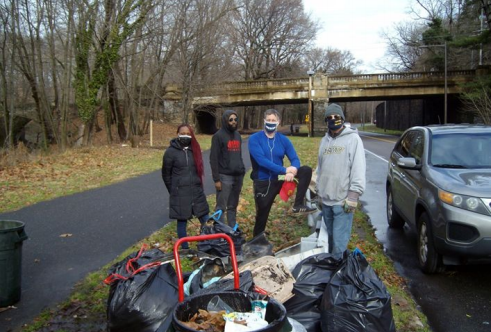
Philadelphia, PA (January 31, 2022)
This project/program was funded (in part) by the Pa. Department of Health’s Preventive Health and Health Services Block Grant.
Feet First Philly is Philadelphia’s only pedestrian advocacy group. The group is sponsored by Clean Air Council. For the second consecutive year, the Council and Feet First Philly partnered with the Philadelphia Department of Public Health to provide funding for neighborhoods to improve walkability in their communities. The projects awarded are located throughout Philadelphia and all seek to enhance public spaces.
This mini-grant program was created to allow community groups, residents, and even local businesses to become active in improving public spaces, by using community-led designs to improve safety and beauty. This program demonstrates ways in which a small amount of funding can have a big impact on neighborhoods when residents lead the effort. A historic lack of investment in public spaces in Philadelphia’s communities of color is a chronic problem, this mini-grant program prioritizes those neighborhoods that have historically been overlooked.
In the first year of the mini-grant program, Feet First Philly funded seven amazing projects. This year, over 60 residents, businesses, and community organizations submitted applications. Thanks to the city funds which were supplemented by our generous donors, the program will be able to support a total of nine mini-grants this year.
The projects selected will implement unique strategies to address different barriers to public spaces in their neighborhood. Feet First Philly recently announced the first 5 projects and will announce the additional four winners in the near future.
Cobbs Creek Ambassadors will expand its efforts in cleaning up the Cobbs Creek Trail. This year, the group “aims to establish a Trash, Trees, and Trails (T³) mission, a more holistic approach to engaging neighbors in the park’s revitalization.”
Norris Square Neighborhood will install community bulletin boards in front of two of their garden spaces to provide various information to neighborhood residents and create more welcoming spaces for neighbors to enjoy.
Southwest Community Development Corporation will create an outdoor space for community members to access and engage in various activities. This space will act as a pocket park for the neighborhood.
ACHIEVEability will increase safety, cleanliness, and neighborhood pride by beautifying the 60th Street Commercial Corridor between Arch and Chestnut Streets.
Hansberry Garden and Nature Center will enhance a meadow as a local walking destination with a welcome sign, seating area, and other amenities.
The additional four awardees will be announced soon. Follow Feet First Philly on Facebook, Twitter, and Instagram for updates on the additional projects!
For more information contact Titania Markland, Transportation Outreach Coordinator, tmarkland@cleanair.org.

Philadelphia, PA (January 30, 2022) The Pennsylvania Department of Environmental Protection (DEP) claims to care about environmental justice. It has a policy in place that it claims ensures the fair treatment and meaningful involvement of all people regardless of race, color, national origin, or income when it comes to environmental policies and protections. This policy was implemented in response to a 2001 report that detailed the significant substantive and procedural problems with permitting that have created inequity in the distribution of environmental harms. Yet time and again, when facing real-world environmental issues, DEP’s commitment to environmental justice comes up short.
As one of the state’s oldest environmental nonprofits, Clean Air Council has a long history of working with DEP. In these interactions, the Council has found the Department unwilling to commit to meaningfully apply its own Environmental Justice Public Participation Policy. Such lack of commitment is only more frustrating because that policy already fails to go nearly far enough to fully address environmental injustice in Pennsylvania. The Policy only provides a modicum of additional public information and participation opportunities when certain new permits are about to be issued, and does nothing to strike at the heart of environmental injustice: it does not give DEP guidance on when to deny or strengthen permits, even where it has the authority to do so.
The Policy, even if properly followed, therefore does little more than inform low-income communities and communities of color about the environmental harms they face. These are often communities that lack the resources to hire experts to fully explain what the potential harm to health, quality of life, and local ecosystems might be. It does nothing to address the historical and continuing injustice these communities face from the cumulative impacts of many sources of pollution over many years.
DEP is currently updating this environmental justice policy. According to StateImpact Pennsylvania, DEP wants the new policy to position DEP as a better resource for environmental justice communities. The public wants that, too. Surveys have shown that Americans consider environmental justice to be a pressing issue in our communities. DEP has launched a process to gather public input to strengthen its EJ Policy, but the Department must then treat that document as more than mere suggestions to be forgotten or outright ignored.
It’s time for the Wolf administration to get serious about environmental justice not just on paper, but in practice. Indeed, many environmental justice communities and their advocates have little trust that a revised policy will be taken any more seriously by DEP leadership. DEP needs to acknowledge the power and resource imbalance between these communities and the polluting industries seeking to externalize costs onto community members, and DEP needs to become an advocate for the community in the face of this imbalance. What EJ communities need and have a right to are concrete environmental justice regulations that must be enforced by either DEP or, failing that, the courts.
The Pennsylvania House Black Caucus introduced a bill back in October that would allow DEP to deny permits for the cumulative or disproportionate impacts they could have on disadvantaged communities. But the Wolf administration does not need to wait for legislative action. As the Council has pointed out to the DEP in comments, current laws like the Air Pollution Control Act grant DEP the power – and the responsibility – to deny permits for the harm they could cause to a community’s health. If the DEP wants to improve its environmental justice policy, it must take that responsibility seriously.
For more information contact Legal Fellow Joseph A. Ingrao, Esq. jingrao@cleanair.org.

